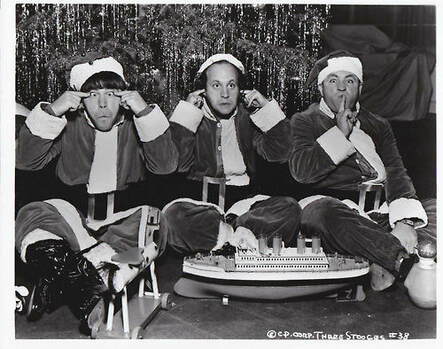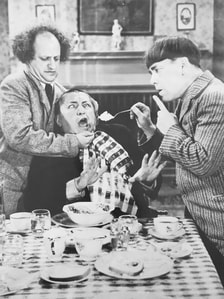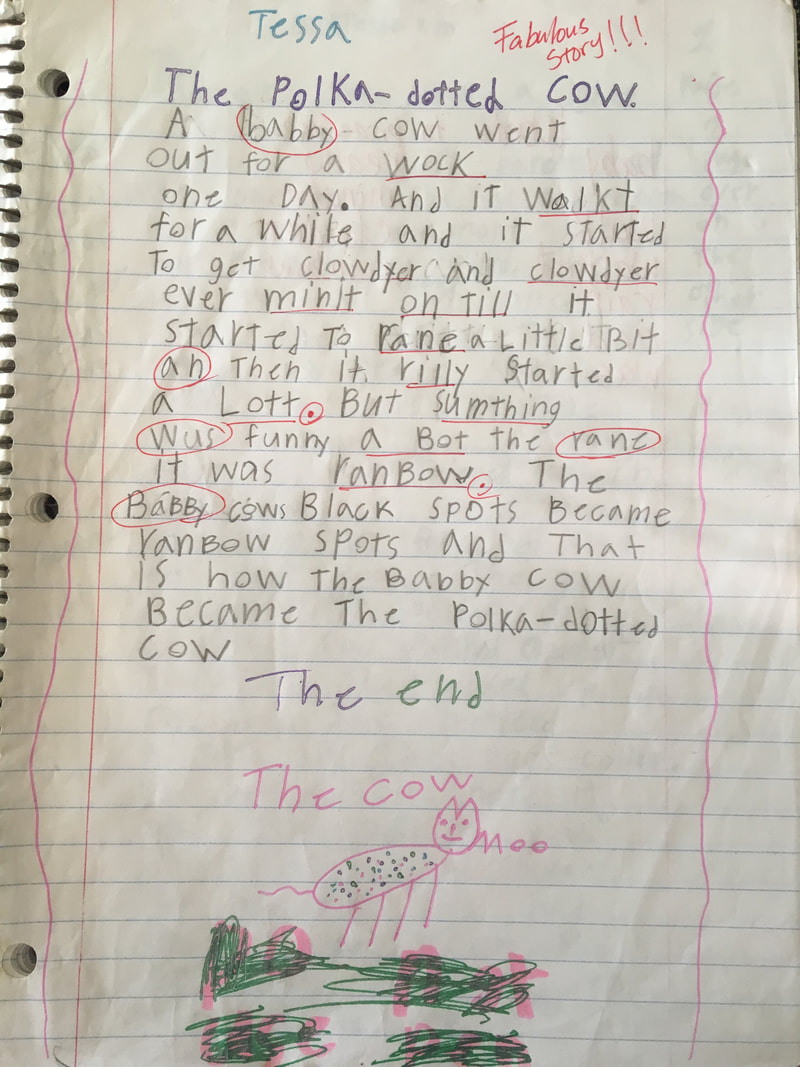|
Growing up with The Three Stooges as my family has pointed out something to me: the immense, age-defying, life-changing effect that you can have on people. We’ve all witnessed that, I’d imagine, with celebrities we admire and artists and philosophers. We’ve seen what one man/woman can do (David Bowie, JK Rowling, Stan Lee…), but it’s distant. We are the effect of it, or maybe we’ve witnessed it, but we haven’t all created it. For me, I’ve been a conduit for that effect. I have watched people light up and laugh and become filled with love and nostalgia just because I said that my great-grandfather was Moe. Men, women, strangers, friends, young, old… It’s like wielding a little bit of old, inherited power. “You made my day,” I’ve been told. The Three Stooges were Jewish men in a time when parts of the world hated anything Jewish. They were their own kind of funny—an iconic kind of funny. They could be appreciated by anyone. They struck something, something I don’t think people strike often these days. Their humor needed no language. You could see it, quite literally. But it was more than that. They loved what they did, and so did others. Myself included. And they knew. That’s the thing. I can’t speak as much for the other guys, but my dad told me that Moe would keep photos and things in the trunk of his car, so if ever he got recognized, he would have something to sign and give to them. That’s a kind of appreciation often lost these days. They knew what they had. They knew what that meant. “I recall that every Christmas my dad played Santa to the children at an organization called the Spastic Children’s Guild. These were young children with spastic paralysis. Moe would go to downtown L.A. and haunt the wholesale houses. These were places owned by fans and people he knew from Brooklyn days. He would ask everyone he contacted to donate toys, clothing you name it. As payment for the donations, he’d tell a joke and have the donors in Stooge stitches. My dad was always concerned about helping “the underdog.” He would always say how lucky he felt to do what he loved to do and make a living while doing it.” – Joan Howard Maurer, my grandmother (read the original article here) Despite the slapstick violent humor, that’s the kind of person he was. He saw the other side. He knew who was watching, and he cared too. I think that’s part of why they’ve endured so well. I forget sometimes about the other side of art. I’ve always tried to be vocal about what I do, and about the fact that you just have to write and keep writing. Some of the younger friends I had back in my teens would come to me for advice—and they still do. They remember from back in the day. New ones too. And you know what? That’s so cool. Not everyone can say that. It’s no Stooge-level impact. I will never be exactly what they were (which is totally fine), but I can see a small power forming, a small ability to impact other people. It’s all the more reason and motivation to continue. I’ve come this far, and I’m starting to see that there are people on the other side of my art. I recognize that I’ve set myself up as someone who is going to “do things”. I can see it already, thanks to the Stooges and the stunning effect they created, and I know it is no small thing to matter in someone else’s world.
0 Comments
I was not one of those kids with my nose in a book, destined to write them because hell, I lived in them more than the real world. Wasn’t me. I watched a lot of TV shows and movies—hundreds and hundreds. All the men on my father’s side were screenwriters. I grew up watching my great-grandfather and his brothers smack each other around in the Stooge shorts. Visual, physical comedy. Kids in my schools were actors, and it was (and is) a regular occurrence to have the streets in my neighborhood turned into film sets. It’s what I knew. That was real life for me! I did love books, though. My mom used to read to me all the time when I was young. Mystery books, ghost stories, fantasy—all sorts. But reading myself? It was too slow. Too much effort, I guess. I used to buy books, even, but I didn’t get through them. One of my teachers when I was about 8 or 9 years old made us write short stories. Truthfully, I didn't like her, and I wasn't happy about it, but I didn't have much of a choice. She gave me a prompt about how a cow got its spots. It was about a “ranbow spotted babby cow.” I could not spell for shit, and it was not my finest work.
would never ruin the books. That year, Prisoner of Azkaban came out, I watched it, read it, and then...I was stuck. I needed more! So, I did the logical thing: At age 13, I started writing a book. It ended up 30,000 words. A tiny novel. It was part of a trilogy. I’d put a lot of effort in, and that was when I knew I had to do something with it—that I had to become an author. All because I was waiting, and I wanted to live in another story like I had in Harry Potter. Hey, whatever gets you going. Sometimes, I feel like an imposter. I wasn’t one of those kids—I didn’t live in books until I was 12. Why should I get to write when I didn’t always love to read? When I don’t read every day? There were many years of my life where I would happily say that I hated reading. Now here I am. I get funny looks when I say that I hated reading, and yet, now I’m a writer. I still fall out of reading and will read only a book or two in a year. Other times, I’ll read several in a week. But even so, I’m still writing books, and I love to read when I do. I just didn’t grow up with the habit, but I know what I am, no matter how I came to be. Does that make me any less of a writer? No, it doesn’t. You don’t have to fit the standard to be something. You just have to be it. It doesn’t matter if you find your passion at 4 or 44 or if you spent years obsessed or 6 months. You’re not an imposter. You’re not any less. All that matters is that you’re doing it, whatever it is. That’s the only difference between those that are and those that are not. So, what are you? I want you to take a good look at that title. Starving artist. That romantic, brooding musician who sleeps on a couch and has holes in his clothes and drama so high he’ll probably write in blood. That struggling actor who lives in his car and works three shit jobs and runs on Adderall. The waitress with dreams that can’t catch a break. The writer who just can’t make a deal fly and is bitter of trying, like it almost makes it better to have failed. I’ve seen it. I grew up with it all around me in Los Angeles. You could call it a side effect of hustling, of drive, of perseverance. We all know it. We’re meant to live it—prideful to accept it. It excuses the failure, the pocket change exchange, the short on rent and sleep. Chase the bitterness with alcohol. Laugh at the narcissism with a side of self-doubt and nothing for dinner. But take another look: starving artist. Not aspiring but starving. Not trying. Not climbing. Not up. I’ve seen it romanticized, idolized, held onto like a badge of pride. Scars. Tattoos. Holier than thous. You’re tough. You’ve earned it. Hell, you don’t even want success, anyway. You’re right by being wrong. You’ve beaten the system, right? Who fed that bullshit to you? You were slung an insult and you took it like a truth. Experience has value, and so does drive. Bloody your knuckles and bloodshot your eyes until the sun comes up, and if it doesn’t work, do it again. But there’s still a lie. There’s still something not quite right. As much as society loves art, it shits on the artist. “Get a real job.” “You contribute no value, but I’ll pay $15 to see your movie and claim I can do better.” And the best: “Can you do it for free?” and the anger that ensues when you won’t. Starving artist. That’s what they tell you. That’s what they want you to be. Why? Because if you think it’s the dream to starve as an artist, that it’s just “part of the struggle”, then they have you. They own you, and they don’t have to feed you. They can keep you down, because you think you gain meaning from squalor. That’s the dark dream, the life you have to live, or success can’t be real. You can have millions but be an addict. You can have billions and want to die. Why? Because you were taught to be starving. You were taught that you don’t deserve to have more, that you have to suffer and starve for it. You were never meant to break out of the 9-5 ‘til you die life. You were taught to fail, even when you have success. Artists are supposed to starve, right? You’re not the breadwinner, right? Fuck. That. You are the light in the dark. You are the music in the silence. You are the words no one else could say. You are the mirror. You are fucking magic, creating something out of nothing. You are terrifying, because you can change everything. Don’t sell yourself short, because the rest of the world would love to, and they'd be happy to see you starve. They'd be right all along. Don’t buy the toxic fantasy they sold you. It wasn’t made by an artist. Starving artist. Bullshit. I have learned that there are two primary types of writers:
Truth be told, I’m the main one I know who fits into #2, but I’m definitely not the only one. Like Neil Gaiman says, “Writing a novel is like driving through the fog with one headlight out,” and then he goes onto say that you can’t see very far ahead of yourself. Ain’t. That. The. Truth. Well, it is for me, anyway. Several years back, I gave one of my books to my brother to read. The thing is, my brother is not a reader, and while he really liked my book, it took him a year to finish it. That meant I had some time to twiddle my thumbs, but…that’s boring. I write, after all. That’s just what I do. I remember seeing the streetlight outside one night, and I thought of a figure, and I thought of a voice, and I just started writing. What was it about? Didn’t know. Who were the characters? I’d figure it out. I purposely kept moving forward. I didn’t go back and change things. That was my rule. Maybe some characters come in a little later than usual. I mean, I didn’t know they existed yet, so they just had to end up there. I ran with it. I kept going. Soon, I knew more and more. Eventually, I knew all 200,000 words of it, and I finished the first draft. Twice as long as the book my brother was reading. Maybe if I really tried, I could have planned it all from the get-go. Honestly, I probably would have dropped it. After all, I couldn’t see too far down the road. I just had to keep driving, slowly at times but driving, until I saw enough signs that I knew where I was going. I do that with a lot my writing. Maybe I know the middle, but not the end. Maybe I know the end, but not the middle. The thing is, I don’t care. I keep writing. Sometimes, I get stuck on one book, and I work on another. Either way, I always try to keep writing, even when I don’t know what I’m doing. Especially when I don’t know what I’m doing. Sometimes this means that you realize something you should’ve done differently halfway through, and you’ve got a whole editing task on your hands, but that could happen either way. Writing is an adventure. Sometimes I walk into a scene and, just like life, I don’t know what’s going to happen next until it happens. Someone could die by the time the scene is through that I thought would last until the end. It’s like living your story as it happens. That makes the future hard to predict sometimes, and the end a distant thing. I don’t think that should ever stop you. You don’t have to know everything, not until the end, and sometimes not even then. Here’s the thing about writing advice, though: There is no one-size-fits-all. There is no right way to write. The only right way to write is whatever the hell gets you to write. Maybe you need to plan every scene, but consider that…maybe you don’t. Consider that maybe you just need to write and keep going forward until you’re done. If you’re always planning and never writing, go write. Take that risk. If it turns into a monster, dissect the good parts and build a better monster. It’s nice to get it right the first time, but you don’t have to. That’s what second drafts are for. |
AuthorTessa Maurer Archives
April 2020
Categories
All
|



 RSS Feed
RSS Feed
